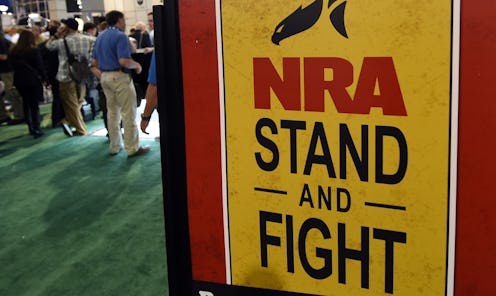News
There's WAY More Behind The NRA's Influence In Congress Than Cold Hard Cash

In the wake of the deadly school shooting in Parkland, Florida, there's been a huge debate over whether members of Congress have been "bought" by the National Rifle Association (NRA). It's a debate that often follows mass shootings: we heard it after the Las Vegas shooting, we heard it after Newtown. The NRA is indeed incredibly influential and active — the special interest group lobbied for more than a hundred bills in Congress in 2016 alone — but is money what makes the NRA so powerful? You may be surprised to learn it's not the group's money that captures and holds lawmakers' attention.
"The NRA's main source of power, although they are a major actor in the money and politics space, is actually from their large membership," Sarah Bryner, a research director at The Center for Responsive Politics, tells Bustle.
The NRA's influence in local, state and federal politics is undeniable. Even legislators have recognized it. Democratic Sen. Kirsten Gillibrand characterized the NRA as having a "chokehold on Congress" in an interview on The Late Show with Stephen Colbert. "This is unfathomable how many deaths we've had to see over and over and over again, and Congress has done nothing," Gillibrand said. "The silence is literally deafening."
In the wake of mass shootings, a number of people point to the money that the NRA slips into politicians' pockets via campaign cash. Over the past 20 years, the NRA has donated more than $4 million to current members of Congress, according to the Washington Post. But if you really dig into the numbers, what the NRA gives to state and federal lawmakers just doesn't add up to influential amounts.
According to Bryner, the maximum contribution the NRA could make directly to a candidate "is a drop in the bucket" compared to the hefty cost of a congressional campaign overall. So while the NRA does donate millions of dollars to both state and federal lawmakers, the organization's influence is about more than just its checkbook.
Florida Sen. Marco Rubio said as much at CNN's "Stand Up: The Students of Stoneman Douglas Demand Action" town hall Wednesday. "The influence of these groups comes not from money," Rubio told Cameron Kasky, a student at Marjory Stoneman Douglas High School, when asked if the Republican senator would stop accepting money from the NRA. "The influence comes from the millions of people that agree with the agenda, the millions of Americans that support the NRA."
Currently, the NRA claims to have more than 5 million members. That's a considerable amount of weight to throw around in support of — or in opposition to — a candidate or a sitting lawmaker. According to Dr. Robert J. Spitzer, chair of SUNY Cortland's Political Science Department and the author of five books on gun policy, the threat of grassroots retaliation from its membership base is a big part of what makes the NRA so powerful.
"The key thing about the NRA and its followers is that they're highly motivated," Spitzer tells Bustle. "They care deeply about the gun issue — for them it's their number one concern." According to Spitzer, while most Americans favor stronger gun laws, the issue of gun control doesn't often lie at the top of their list of priorities. By contrast, a significant number of NRA members are often solely focused on gun rights when they make decisions at the ballot box.
Spitzer says another key element of the NRA's influence is its ability to mobilize that huge member base. The organization spends a significant amount of money on internal communications, which both help it get its message out and keep members educated and informed about gun-related legislative issues. The NRA is also very strategic about how it presents those messages, using dramatic, emotional, and fear-based rhetoric to frame gun control measures as attacks on members' individual values, identities, and way of life. In building up gun rights culture and pushing such a dramatic narrative, the NRA has created an incredibly engaged member base.
According to Spitzer, NRA members don't just cast their votes based on gun rights issues; they'll donate money and they'll engage directly with lawmakers, whether through writing letters and emails or showing up at town halls and other local meetings. "They do all those things in politics that most Americans don't do," he says.
Congress certainly feels the effects of the money the NRA spends, whether it's through campaign cash or political ad buys. But these gun policy and money in politics experts say the organization's real power comes from its ability to effectively flex the muscles of its membership base. Basically, it's the NRA's ability to reach and spur its members into action that allows the group to influence lawmakers at the local, state, and federal levels. As Spitzer puts it, "To a great degree in American politics, the group that wins is the group that shows up."